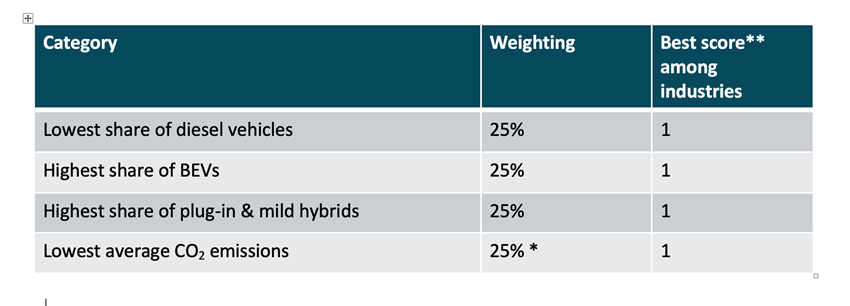Context
- Transport is the fastest-growing contributor to climate change, with road transport accounting for approximately 20% of carbon dioxide emissions in the EU alone.
- Approximately 50% of vehicles on the road today are registered to corporate organisations. Corporates are therefore incredibly important in leading the transition to a more sustainable transport system.
- Making the switch to a low-emission fleet is one of the easiest ways for businesses to reduce their overall emission footprint and to help tackle climate change. It can be done with very little effort; no change of strategy is required.
If you need a complete report for a specific industry, please email us at: marketinglpro@leaseplan.ro
About the 2020 Fleet Sustainability Ranking
LeasePlan’s Fleet Sustainability Ranking by Industry is a comprehensive analysis of the differences in the rate of sustainable adoption between 10 industries across 24 European countries. The 2020 ranking is the 2nd edition.
The ranking is based on four factors: the share of diesel, the share of battery electric vehicles (BEVs), the share of hybrids and the level of CO2 emissions.
The study covers all passenger cars leased from LeasePlan by companies operating an international fleet (500,000+ vehicles). To ensure that the data is representative, in each country included a total of at least 500 vehicles must be leased by at least 10 different companies.
The ten industries included in the research are: Automotive, Construction, Consumer Goods, Energy & Chemicals, Financial & Professional Services, Healthcare, Industrial, Pharma, Technology, and Transport.*
*For a definition of all ten industries, please see Annex A: Definition of industries
Key findings
Fleet Sustainability Ranking 2020
- The three industries leading the trend away from fossil-fuelled vehicles are Financial & Professional Services, Energy & Chemical and Technology. These industries score consistently highly on all the fleet ranking criteria.
- The Financial & Professional Services industry has emerged as the best performer for the second consecutive year. The industry shows a strong decline in diesel, plus the biggest share of BEVs and the lowest CO2 emission average out of all the industries.
- The BEV share is really taking off, with some industries having increased their share tenfold in the past two years.
- Overall, all industries show an increase in CO2 emission averages* due to the increasing popularity of SUVs and the increasing share of petrol vehicles (which generate relatively high CO2 levels).
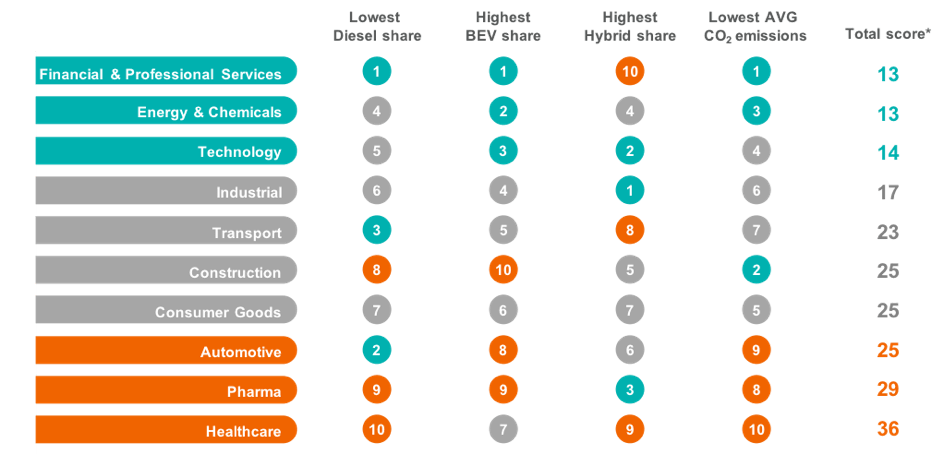
2020 Fleet Sustainability Ranking by Industry
- The Financial & Professional Services (F&PS) industry has taken the top spot despite having the same score as the Energy & Chemicals (E&C) industry because it holds three out of the four number-one spots.
- The Construction, Consumer Goods and Automotive industries all have the same score. However, the CO2 score is regarded as the most important metric which is why the Construction industry is ranked in sixth place.
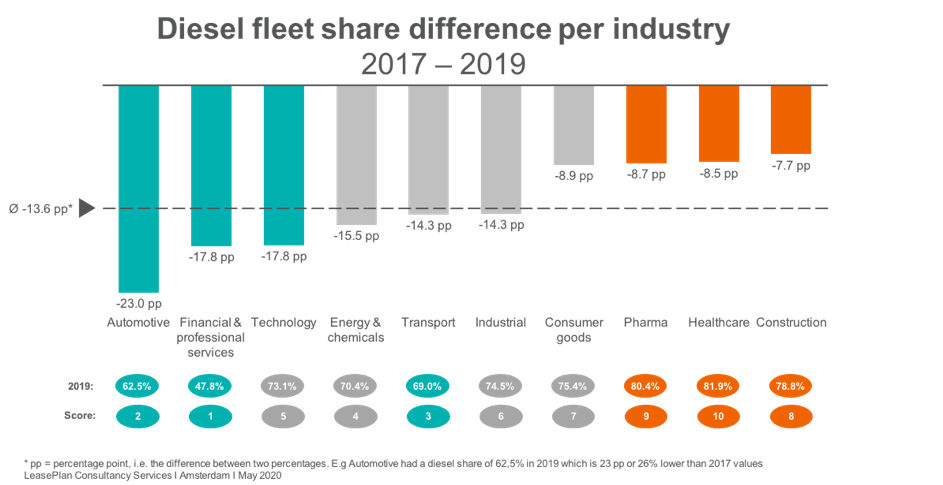
Automotive industry achieves the biggest decrease in diesel share
All industries have continued to decrease their diesel share over the past two years, but there are significant variations in pace. The Automotive industry has achieved the largest decline in diesel share, but F&PS still has the lowest share with less than 50%. Whilst still having a large share of diesel, the Technology industry is now catching up, decreasing its diesel share almost as fast as the F&PS industry.
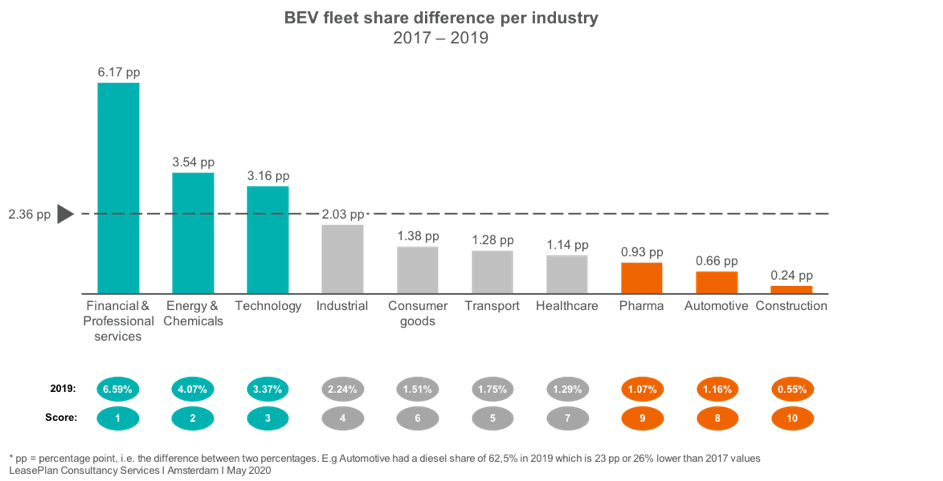
BEV share has increased as much as tenfold in the past 2 years
- Adoption of battery electric vehicles has really taken off in the last two years with a tenfold increase in some industries.
- Leading this trend is the F&PS industry, where BEVs accounted for one in every 15 vehicles ordered in 2019.
- At the other end of the spectrum is the Construction industry, which is still in an early BEV adoption phase (less than 1% BEVs)
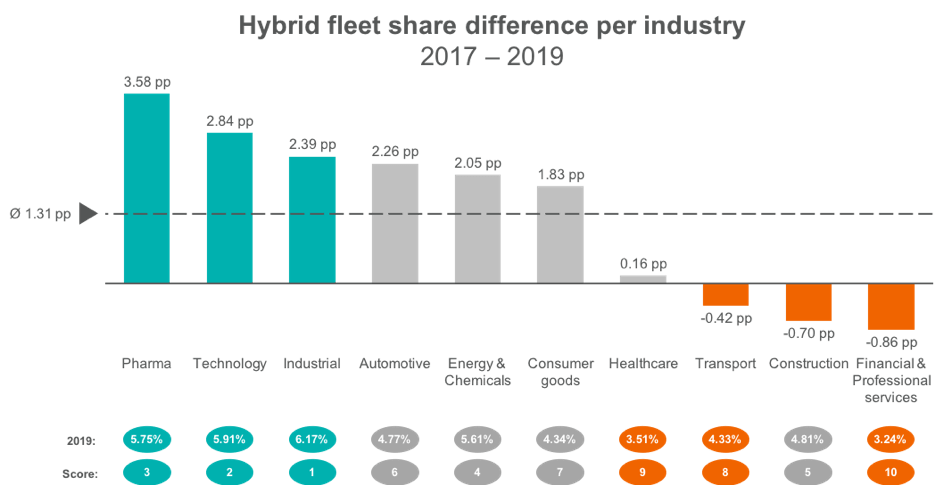
Energy & Chemicals and Technology industries lead PHEV adoption
- These figures include both plugin hybrid electric vehicles (PHEVs) and mild hybrid vehicles.
- PHEVs have been very popular in the past due to government subsidies but these have since been stopped in some countries.
- Overall, the average hybrid vehicle has a better impact on sustainability than a regular petrol/diesel vehicle.
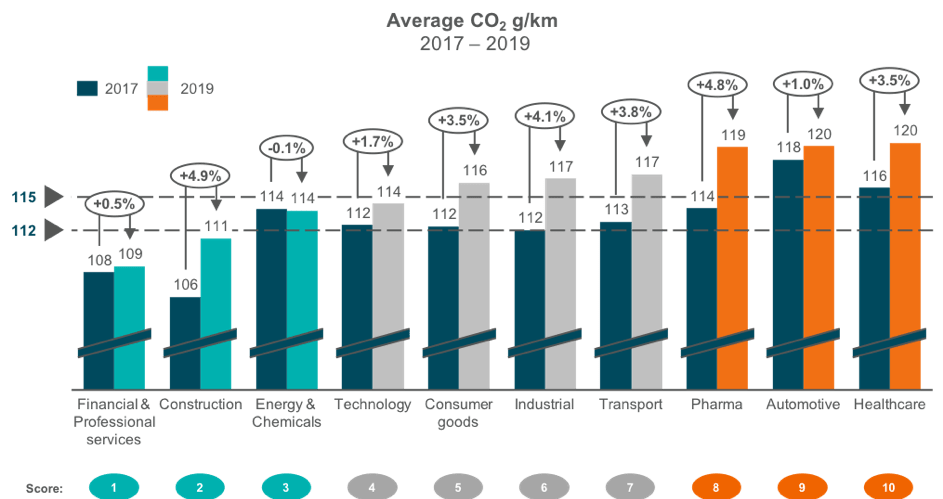
The introduction of WLTP in 2018 has increased CO2 levels
The rise in the average CO2 level is mainly caused by the transition to WLTP, the increased popularity of SUVs and the increased popularity of petrol vehicles. E&C is the only industry with lower CO2 levels due to a relatively high share of diesels being replaced by either BEVs or hybrids. The increase in the Construction industry is remarkably high. This is mainly caused by a relatively large share of small vehicles.
Annex A: Definition of industries
Automotive: Companies operating in the vehicle-development supply chain including OEMs and aftermarket companies (no rental companies) Construction: Companies involved in developing any physical buildings or infrastructure or being part of the building/infrastructure-development supply chain Consumer Goods: Companies developing or selling consumer products (FMCGs, retailers, etc) Energy & Chemicals: Companies operating in the production, distribution or sale of energy (oil, electricity, gas) or chemicals Financial & Professional Services: Companies offering financial products (banks, insurers, etc) or professional services (accountancy and consultancy) Healthcare: Companies developing, selling or buying healthcare products (apart from pharmaceutical drugs) Industrial: Companies producing or maintaining physical material or products for the B2B sector Pharma: Companies that research, develop, produce or market pharmaceutical drugs for use as medications to be administered/self-administered to/by patients, with the aim to cure them, vaccinate them or alleviate their symptoms Technology: Companies primarily involved in the development of hardware or software products Transport: Companies involved in transport of goods or people (aviation, parcel delivery, public transport, etc)

